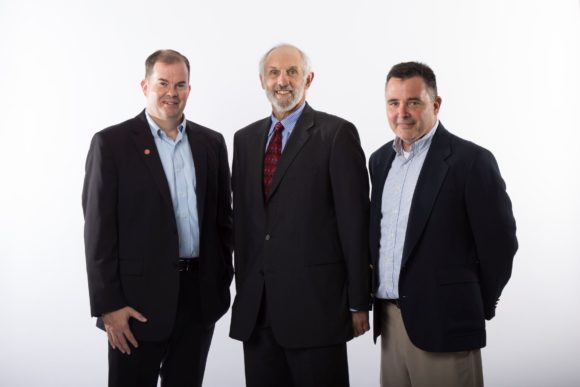
Brian Schilling, Ira Polk, and Stephen Komar. Photo: John O’Boyle.
This spring, The Clearing Corporation Charitable Foundation endowed $1 million to develop a new agribusiness scholars program at Rutgers School of Environmental and Biological Sciences. In addition, the Foundation recently announced a challenge grant matching all donations up to an additional $250,000.
Named the Clearing Corporation Charitable Foundation Agribusiness Scholars Program, it will equip high achieving students with the knowledge, leadership qualities, analytical skills, and experiences required for successful careers in the domestic and global agribusiness sector. Here, we chat with Ira Polk RC’71, RBS’73, a director at the Clearing Corporation Charitable Foundation, about this groundbreaking gift.
Q: What attracted the foundation to SEBS?
A: We are a Rutgers family! I went to Rutgers Undergraduate and Graduate School of Business, my wife went to Douglass, and my daughter attended Cook. I grew up in Hudson County, and like many students at Rutgers, I did not grow up wealthy and had to work many different jobs to pay for my college education. I began my career as a CPA and ultimately developed expertise in financial services, focusing on futures and the commodities markets.
Many of my fellow Foundation Board members have similar financial industry backgrounds. Although we have traditionally funded many esoteric research projects, recently we refocused our funding on student training and scholarship programs. We collectively believe that students who want to succeed need access to real world experiences and mentors who can bridge the gap between classroom learning and skill sets that are required on the job.
Because of my past ties to Rutgers and my current dealings with Rutgers Cooperative Extension, I approached Stephen Komar and Brian Schilling of Rutgers and asked, “What can we do?” “How do we get the next generation of students involved and trained?” From those simple questions, the Agribusiness Scholars Program was born. The Foundation Board unanimously endorsed the concept and made not only the core funding available, but also issued the $250,000 matching program challenge.
Q: What need were you trying to fill?
A: We are not only simply trying to bridge the gap between what students learn in the classroom and what employers require of today’s students, but rather, demanding and challenging these students to think and perform at top management levels.
They will be introduced to all aspects of global business. In addition, students will be introduced to problem solving and the decision making process that is required of today’s executives.
Q: What is your goal for this program?
A: The goal is to broaden students’ horizons. It’s not just growing and producing things; there’s a whole world beyond that. They will learn that agribusiness on a global basis is more exciting and challenging than they ever imagined. We want to train these students to be contributing to their employers from the outset. We want them to succeed and be the Next Generation of Agribusiness Leaders!
For further information, please contact Brian Schilling, agricultural, food and resource economics associate professor, at 848-932-9127; Stephen Komar, agriculture and resource county agent, at 973-948-3040; or Melissa McKillip, associate dean for philanthropy and strategic partnerships, at 848-932-4214.
Editor’s Note: this article originally appeared in Explorations Fall 2017.

